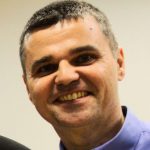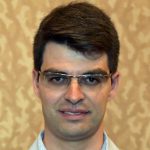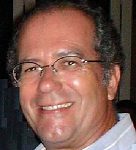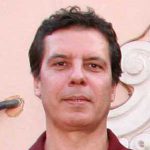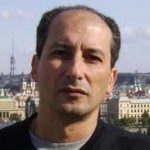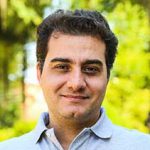Alline graduated in Pharmacy from the Federal University of Juiz de Fora (2005). She holds a Master’s and a Ph.D. in Biological Sciences (Pharmacology) from the University of São Paulo (2006-2011) with a sandwich internship at the Complutense University of Madrid (Spain – 2009-2010). She held postdoctoral internships at the Department of Infectology and Tropical Medicine at the Federal University of Minas Gerais (2011-2013) and the Department of Molecular Biology and Neuronal Signaling at the Max-Planck Institute of Experimental Medicine in Göttingen, Germany (2014 -2015). She participated in the Boehringer Ingelheim Fonds short-term visit program in Prof. Dr. Gerd Kempermann at the Center for Regenerative Therapies in Dresden, Germany (2013). She is a Ph.D. professor in the Department of Pharmacology at the Ribeirão Preto Medical School (University of São Paulo), where she develops research in Neuropsychopharmacology focused on the study of the participation of plastic events in the central nervous system (neurodevelopment, adult neurogenesis, neuroprotection-mediating intracellular pathways, dendritic remodeling, neuroimmune modulation) in the mechanisms of action of psychotropic drugs.
RESEARCH LINES
- Role of plastic processes in the Central Nervous System in the mechanisms of action of psychotropic drugs.
Carlos graduated from the School of Pharmaceutical Sciences of Ribeirão Preto/USP (1998). He holds a Master’s (2001) and a Ph.D. (2005) in Pharmacology from the Ribeirão Preto Medical School/USP under the supervision of Prof. Dr. Ana Maria de Oliveira. His postdoc was at the Institute of Pharmacology, School of Medicine, University of Sherbrooke, QC, Canada (2005-2006) supervised by Prof. Dr. Pedro D’Orleans-Juste. He was hired in 2006 as a Ph.D. Professor in RDIDP, and he is currently a Professor at the Ribeirão Preto Nursing School-USP. He is an advisor in the graduate programs in Pharmacology at the Ribeirão Preto Medical School/USP and in Psychiatric Nursing at the Ribeirão Preto Nursing School/USP. He has experience in Cardiovascular Pharmacology, mainly in ethanol pharmacology/toxicology, cellular/molecular mechanisms involved in vascular dysfunction, and oxidative stress.
RESEARCH LINES
- Effect of chronic and acute ethanol consumption on the cardiovascular system
- Effect of ethanol abstinence on the cardiovascular system
- Mechanisms involved in vascular endothelial dysfunction
Felipe is a Ph.D. Professor at the Department of Pharmacology, Ribeirão Preto Medical School, University of São Paulo (FMRP/USP). He has a degree in Pharmacy from the Federal University of Juiz de Fora (2008) and a Master (2009-2011), and a Ph.D. (2011-2015) in Biological Sciences (Pharmacology) from FMRP/USP. His postdoc was in Dr. Anthony Grace’s laboratory at the University of Pittsburgh (May/2015-Dec/2018). He is currently a member of the Education Committee of the Schizophrenia International Research Society (SIRS). He receives financial support from FAPESP’s Young Researcher Program working on the following topics:
– (De)Regulation of the dopaminergic pathways;
– Stress as a risk factor for the development of schizophrenia;
– New pharmacological targets for the treatment of schizophrenia.
RESEARCH LINES
- Stress as a risk factor for the development of schizophrenia
- Neural substrates involved in the (de)regulation of the dopaminergic pathways
Fernando is a Professor of Pharmacology at the Ribeirão Preto Medical School, University of São Paulo, SP (FMRP-USP). He has experience in Immunopharmacology, focusing on Inflammatory Diseases, working mainly on sepsis, rheumatoid arthritis, mechanisms involved in tissue damage, leukocyte migration, innate immune response, and cytokines. He is a member of the following Academies of Science: World Academy of Sciences (TWAS), Brazilian Academy of Science (ABC), Academy of Science of the State of São Paulo, Ribeirão-Pretana Academy of Science. He is currently the coordinator of CRID – Center for Research in Inflammatory Diseases (CEPID-FAPESP), Coordinator of the Institute for Advanced Studies USP- Ribeirão Preto Hub, Ad doc Consultant of the National Council for Scientific and Technological Development, Foundation for Research Support of the State of São Paulo, Studies and Projects Development Agency, and CAPES. He is a representative on the Board of the Innovation and Technology Park of Ribeirão Preto. He has published over 500 scientific papers in international journals, which received over 20,000 citations, with an H index of 70 (Scopus).
RESEARCH LINES
- Mechanisms involved in leukocyte migration in inflammatory models
- Sepsis
- Role of cytokines in the genesis of inflammatory pain
Fernando graduated in Biomedical Sciences from FMRP-USP (1970). He holds a Master’s (1973) and a Ph.D. (1975) in Pharmacology from FMRP-USP. His postdoc was in Dr. Solomon Snyder’s Laboratory – Department of Pharmacology – Johns Hopkins Medical School – MD-USA (1980) and in Dr. Juan M. Saavedra’s Laboratory – National Institute of Mental Health, MD-USA (1981). He is a Professor at the Department of Pharmacology at FMRP-USP (1994). Also, he is an advisor at the Graduate Program in Pharmacology at FMRP-USP, and a member of the Program’s Coordinating Committee. He has experience in Pharmacology, focusing on Neuropsychopharmacology, working mainly on the study of central control of blood pressure and cardiovascular correlates associated with stress.
RESEARCH LINES
- Study of peripheral neurotransmission
- Study of the central control mechanisms of blood pressure, biogenic amines, and hypertension
Fernando graduated in Pharmacy from the Federal University of Mato Grosso (2004). He holds a Master’s (2006) and a Ph.D. (2011) in Pharmacology from the University of São Paulo. He had an internship at the Medical College of Georgia, USA (2007-2011) during his doctoral period. His postdoc was at the Department of Pharmacology at FMRP-USP with a FAPESP-funded Young Researcher grant. Currently, he is a Professor at the Department of Pharmacology at the Ribeirão Preto Medical School – (FMRP-USP). He has experience in Pharmacology, focusing on Cardiovascular and Lower Urinary Tract Pharmacology. He works mainly on the following topics: 1) study of the pathophysiological mechanisms of erectile dysfunction and the pharmacology of peripheral mediators involved in the control of the penile erection and the lower urinary tract; 2) study of the control mechanisms of vascular tone and its alterations in different pathological situations such as hypertension, diabetes, heart failure, obesity, and erectile dysfunction.
RESEARCH LINES
- Studies of erectile dysfunction mechanisms in heart failure
Francisco graduated in Medicine from the Federal University of Rio Grande do Sul (1981). He holds a Ph.D. in Pharmacology from the University of São Paulo (1987). He is currently a Professor at the Ribeirão Preto Medical School, University of São Paulo (FMRP/USP). He has experience in Pharmacology, focusing on Neuropsychopharmacology, working on the following topics: nitric oxide, anxiety, glutamate, serotonin, cannabinoids, and stress. He is an advisor of the Graduate Programs in Pharmacology and Mental Health, FMRP/USP, and a member of the Brazilian Academy of Sciences and the Academy of Sciences of the State of São Paulo.
RESEARCH LINES
- Role of atypical neurotransmitters in mental disorders;
- Pharmacological effects of cannabidiol in mental disorders.
Hélio graduated in Pharmacy from the School of Pharmaceutical Sciences of Ribeirão Preto, University of São Paulo (1986). He holds a Master’s (1990) and a Ph.D. (1995) in Pharmacology from the Ribeirão Preto Medical School, University of São Paulo. He had sandwich-type doctoral internships at the London School of Medicine, England, and postdoctoral internships at the School of Philosophy, Sciences and Literature of Ribeirão Preto – USP and the University of Otago, New Zealand. He is currently a Professor at the Department of Pharmacology at the Ribeirão Preto Medical School, University of São Paulo. He was the Coordinator of the Graduate Program in Pharmacology from 2013 to 2017. He has experience in Pharmacology, focusing on Neuropsychopharmacology, working mainly on neural bases of fear and anxiety reactions, and neural substrate of action of panicolytic and anxiolytic drugs.
RESEARCH LINES
- Study of the neurobiological bases of fear and anxiety, with an emphasis on the pathophysiological processes underlying panic and generalized anxiety disorders
- Study of the mechanisms of action of drugs used to treat panic and anxiety
- Analysis of Serotonin Involvement in Emotional Processing
José graduated in Pharmacy and Biochemistry at the Pontifical Catholic University of Rio Grande do Sul (2002. He holds a Master’s (2005) and a Ph.D. (2007) in Pharmacology at the Ribeirão Preto Medical School – USP, and postdoc at the Institute of Infection, Immunity and Inflammation – University of Glasgow. He is currently a Professor at FMRP-USP. He is a member of the Brazilian Society of Pharmacology and Experimental Therapeutics, the Brazilian Society of Immunology, and the Brazilian Academy of Sciences. He has experience in immunoregulation and immunopharmacology, working mainly on the study of mechanisms that modulate the differentiation and plasticity of effector and regulatory immune cells in the context of chronic inflammation and autoimmune diseases, with the ultimate goal of developing new immunomodulatory strategies.
RESEARCH LINES
Immunometabolism: the interest in this line of research is understanding how cell metabolism modulates the differentiation and plasticity of effector and regulatory immune cells (Th17 lymphocytes and Treg; M1 and M2 macrophages) in the context of chronic inflammation and autoimmune diseases;
Immunoregulation: the interest in this line of research is understanding how components of the inflammatory microenvironment (cytokines, alarmins, metabolites, gases, etc.) and intracellular signaling pathways modulate the differentiation and plasticity of effector and regulatory immune cells in the context of chronic inflammation, cancer, autoimmune diseases, and sepsis.
José Eduardo is a Professor at USP, Ribeirão Preto Medical School, Department of Pharmacology. He is a physician and anesthesiologist with a Master’s in Pharmacology and a Ph.D. in Internal Medicine. He works in the field of Cardiovascular Medicine and Pharmacology. He is a Member of the Brazilian Academy of Sciences.
RESEARCH LINES
- Clinical Pharmacology – Study on cardiovascular action drugs in patients with cardiovascular diseases (eventually others), aiming to determine their biochemical mechanisms and their effects. In this sense, the pharmacogenetics of these drugs is also investigated, aiming to examine how genetic alterations contribute to altering the response to drugs.
- Cardiovascular pharmacology – We conduct interdisciplinary studies of mechanisms involved in signaling mediated by nitric oxide and associated molecules, including nitrites and nitrates, in cardiovascular diseases, particularly hypertension, but, also other diseases, providing a translational perspective.
Leonardo graduated in Physical Therapy from Dom Bosco Catholic University (2000). He holds a Master’s and a Doctorate in Pharmacology from the Ribeirão Preto Medical School, University of São Paulo (2001-2006). As a professor at the Department of Pharmacology at FMRP-USP, he works in the field of Neuropharmacology with an emphasis on studies involving the Neuromodulation of autonomic responses associated with defense reactions. Furthermore, he studies the interaction between the glutamatergic and nitrergic systems in suprabulbar structures on the autonomic responses associated with aversive stimuli.
RESEARCH LINES
- Central control of autonomic responses associated with defense reactions
- Interaction of glutamatergic and nitrergic systems in the central nervous system in the modulation of defensive responses
- Cardiovascular neuromodulation: influence on baroreflex activities and autonomic and neuroendocrine activity
Luiz graduated in Pharmacy in 2005 from the Franciscana University (UFN) in Santa Maria-RS. He holds a Master’s and a Ph.D. in Pharmacology from the Faculty of Medical Sciences of the State University of Campinas (FCM-UNICAMP). His postdoc (2014-2017) was at the Joslin Diabetes Center (Harvard Medical School) with a grant from the American Diabetes Association (ADA). Since 2019, he has been a Professor in the Department of Pharmacology at the Ribeirão Preto Medical School, University of São Paulo (FMRP-USP), where, among others, he coordinates the project Young Researcher – FAPESP. His laboratory focuses on the pathophysiology of metabolic diseases, especially obesity, type 2 diabetes, and nonalcoholic fatty liver disease (NAFLD). In order to understand the pathogenesis of these diseases and identify new therapeutic targets against them, his laboratory develops the following lines of research:
RESEARCH LINES
- Energetic metabolism focusing on brown adipose tissue activation and differentiation mechanisms;
- Lipid biology, focusing on the study of biosynthesized lipids released by adipose tissue and their regulatory activity on glucose and fatty acid metabolism;
- Study of crosstalk between organs/tissues for the regulation of energy metabolism;
- Study of the role of G-protein-coupled receptors (GPCR) in the regulation of metabolism
Michelle is a Ph.D. Professor at the Ribeirão Preto Medical School, University of São Paulo. Her postdoctoral research was conducted at the Department of Pharmacology, University of Alberta, Edmonton, Canada. She holds a Master’s (2005) and a Ph.D. (2008) in Science (Pharmacology) from the Ribeirão Preto Medical School, University of São Paulo. She has experience in Pharmacology, focusing on Cardiovascular Pharmacology, working mainly on hypertension, matrix metalloproteinases, oxidative stress, contractile machinery proteins, remodeling, and cardiovascular dysfunction.
RESEARCH LINES
- Intracellular participation of proteases in cardiovascular alterations in arterial hypertension
- Cardiovascular Pharmacology and Arterial Hypertension
Norberto graduated in Medicine from the Federal University of Espírito Santo (1988). He holds a Master of Science (Magister Scientiae, cum Laude) (Concentration Area: Neuropsychobiology) from the School of Philosophy, Sciences and Literature of Ribeirão Preto- USP (1991). He has a Ph.D. in Science (Scientiae Doctor) (Area of Concentration: Morphology-Cell Biology) at the Ribeirão Preto Medical School, University of São Paulo (FMRP-USP) in 1995 (Department of Morphology). As a former Professor of the Department of Morphology at FMRP-USP (1991-2001), he moved to the Department of Pharmacology at FMRP-USP on 28/02/2001. He has a Postdoc at the Pain Imaging Neuroscience (PaIN) Group of the Department of Physiology, Anatomy & Genetics of the University of Oxford (named “Human Anatomy & Genetics Department” until December 2005), from 09/01/2006 to 30/06/2006, and at the “Centre for Functional Magnetic Resonance Imaging of the Brain (FMRIB) of the Clinical Neurology Department of the University of Oxford (Oxford, England, United Kingdom)”, from 01/07/2006 to 08/ 01/2007. He was an Associate Professor in Neuroanatomy at the Department of Surgery and Anatomy of the Ribeirão Preto Medical School, University of São Paulo (2010), an Assistant Professor at FMRP-USP from 1991 to 1995, a Ph.D. Professor at FMRP-USP from 1995 to 2010, and an Associate Professor at the University of São Paulo, where he has worked in the Department of Pharmacology at FMRP-USP (since mid-2001). After career progression in 2013, he became an Associate Professor III at the University of São Paulo. He has published 112 articles in specialized journals and 241 abstracts in conference and scientific journals. He has 11 book chapters published. He is a “referee” for several international specialized journals (Neuropharmacology, Experimental Neurology, Neuroscience, Brain Research, Pain, Basic & Clinical Pharmacology & Toxicology, Anatomy Record, Clinical Anatomy, Journal of the Peripheral Nervous System, Braz. J. Med. Biol. Res., Pharmacology Biochemistry and Behavior, Physiology & Behavior, Nutritional Neuroscience, Progress in Neuro-Psychopharmacology & Biological Psychiatry, Neuroscience Letters, and Journal of Neuroscience Methods, Journal of Pain). He is an ad hoc consultant to CNPq and FAPESP. He participated in several events abroad and in Brazil. He has supervised 21 master’s students and 18 doctoral students, in addition to having supervised four scientific initiation improvement students, 54 scientific initiation students, seven scientific improvement students, eight final course works. He supervised 13 postdoctoral works in the areas of neuropsychopharmacology, neuroelectrochemistry, neuroanatomy, and neurophysiology, and supervised eight PAE students. He has received seven awards and/or honors. Between 1995 and 2018 he coordinated 13 individual research projects and one thematic project (NAP-USP-Neurobiologia das Emoções-NuPNE), and he was the Principal Researcher or collaborator in another five Thematic/Multiuser Projects. He works in the area of Psychoneuropharmacology, Neuropsychobiology, and in the area of Morphology-Cell Biology, focusing on Descriptive and Applied Neuroanatomy. In his professional activities, he interacted with around 160 collaborators in the co-authorship of scientific papers. He is a member of the Graduate Program in Neurology at FMRP-USP, Member of the Ethics Committee at FCFRP-USP, Alternate Member of the Ethics Committee in Animal Research at FMRP-USP, he was a Member of the Pedagogical Support Group of Ribeirão Preto (GAP-RP-USP), and he is a member of the board of the FMRP-USP Department of Pharmacology. CNPq researcher 1A; H-index: 31 (ISI web of science).
RESEARCH LINES
- Descriptive and Functional Neuroanatomy and Psychoneuropharmacology of Neural Networks that Elaborate Fear, Panic, and Aggression, and Neural Circuits that Control Pain
Ricardo is a Professor at the University of São Paulo, responsible for the disciplines of Pharmacology at the Ribeirão Preto School of Nursing (EERP/USP). He has a degree in Pharmacy from the Federal University of Rio Grande do Sul (2001-2005), with an emphasis on Industrial Pharmacy (2005-2006). He holds a Master’s and a Ph.D. in Pharmacology from the State University of Campinas-UNICAMP (2006-2008 and 2009-2011). He investigates genetic and biochemical risk biomarkers for complex diseases or that predict the pharmacological response to drug therapies, focusing on topics related to cardiovascular and psychiatric diseases.
RESEARCH LINES
- Pharmacogenetics applied to cardiovascular and psychiatric diseases
- Risk biomarkers (genetic and biochemical) for the development of complex diseases in humans
Rita graduated in Pharmacy from the University of São Paulo. She holds a Master’s and a Ph.D. (1996) in Biological Sciences (Pharmacology) from the University of São Paulo. She performed internships at Albert Einstein College of Medicine, NY – USA, University of Montreal – Clinical Research Institute of Montreal – Canada, and Augusta University (Medical College of Georgia), GA – USA. She is a Professor at the Ribeirão Preto Medical School (FMRP) – USP, a Member of the Area Coordination of FAPESP (Foundation for Research Support of the State and São Paulo), and a Member of the Brazilian Academy of Sciences. She has experience in Pharmacology and Cardiovascular Physiology and is interested in signaling pathways that control vascular function and its alterations in hypertension, diabetes, and obesity.
RESEARCH LINES
- Glycosylation with N-acetylglucosamine (O-GlcNAc) and vascular (dys)function
- Immune system and aldosterone in target organ damage in cardiovascular and metabolic diseases
- Sex hormones and cardiovascular function
Sabrina graduated in Biomedicine from the State University of Londrina (2006). She holds a Master’s and a Ph.D. in Pharmacology from the Ribeirão Preto Medical School – University of São Paulo (FMRP/USP). She held a postdoc with FAPESP and PNPD scholarships at the Department of Pharmacology at FMRP/USP. She was a visiting researcher in 2015 with a BEPE/FAPESP scholarship at the “Institute for Behavioral Medicine Research”, Ohio State University, Columbus/OH/USA, in the field of psychoneuroimmunology, under the supervision of Dr. Jonatan P. Godbout. Also, she was a visiting researcher at the Max Planck Institute for Psychiatry in Munich in the laboratory of Dr. Carsten T. Wotjak, with assistance from the Boehringer Ingelheim Fonds and the International Brais Research Organization. In 2018, she was awarded the “For Women in Science” award, an initiative of L’ Oreal in partnership with the Brazilian Academy of Sciences and UNESCO. She is currently a Ph.D. professor at the School of Pharmaceutical Sciences of Ribeirão Preto, University of São Paulo. She has experience in Pharmacology, investigating the involvement of the cannabinoid, glutamatergic, and immune systems and epigenetic mechanisms in behavioral and plastic responses induced by exposure to stress.
RESEARCH LINES
- Study of the involvement of endocannabinoid signaling, neuroimmunological and epigenetic mechanisms in the behavioral, molecular, and plastic consequences of exposure to stress
- Study of the involvement of endocannabinoid, glutamatergic, and nitrergic systems in defensive reactions
Sâmia graduated in Pharmacy-Biochemistry from UFPR (1999). She holds a Ph.D. in Pharmacology from USP (2004). She is currently an associate professor at the School of Pharmaceutical Sciences of Ribeirão Preto at USP. She is a master’s and doctoral advisor at the Graduate Program in Pharmaceutical Sciences at FCFRP-USP and the Graduate Program in Pharmacology at FMRP-USP. She is an associate editor of the journal Acta Neuroppsychiatrica and a reviewer for several indexed international journals. Since September 2016, she has been a visiting professor at the University of Aarhus, Denmark. She has experience in Psychopharmacology, working on the mechanism of action of antidepressants; neurobiology of the stress response; cannabinoids; neuroimmunopharmacology; neuroplasticity and epigenetics.
RESEARCH LINES
- Basic psychopharmacology: investigating the neural processes involved in the neurobiology of depression and the mechanism of action of antidepressant drugs
Sandra graduated in Dentistry from the University of São Paulo (1997). She holds a Master’s in Pharmacology from the University of São Paulo (2000) and a Ph.D. degree in Pharmacology from the University of São Paulo (2004). She held postdoc studies at the Laboratory of Inflammation and Pain at the Ribeirão Preto Medical School – USP (2004-2007) and the Division of Immunology, Infection, and Inflammation, University of Glasgow, Scotland (2008-2010). She is currently a professor of pharmacology at the School of Pharmaceutical Sciences of Ribeirão Preto – USP. She develops works on the study of the mechanisms involved in bone resorption in experimental models of inflammation: arthritis, periodontitis; cellular and molecular mechanisms involved in the differentiation and function of osteoclasts from hematopoietic stem cells.
RESEARCH LINES
- Study of the mechanisms involved in bone resorption in experimental models of inflammation: arthritis
- Study of the mechanisms involved in bone resorption in experimental models of inflammation: arthritis, periodontitis
- Cellular and molecular mechanisms involved in the differentiation and function of osteoclasts from hematopoietic stem cells
Thiago graduated in Pharmacy-Biochemistry from the School of Pharmaceutical Sciences of Ribeirão Preto, University of São Paulo (1999-2003). He holds a master’s (2003-2005), a doctorate (2005-2008), and a postdoc (2008-2010). He is a professor (2016) in Pharmacology at the Ribeirão Preto Medical School, University of São Paulo. He held Sabbatical (Visiting Professor) at Harvard Medical School, Department of Immunology as part of the CAPES/Harvard program for young visiting professors. He was a member of the Brazilian Academy of Sciences. He has been honored with national and international scientific awards, including the 2020 Patrick D. Wall Young Investigator Award for Basic Science from the International Association for the Study of Pain (IASP). He is currently an Associate Professor at FMRP-USP. He is also an academic editor of international journals such as Communications Biology, Brain Research, and Inflammation Research. He has experience in Pharmacology, focusing on Inflammation and Pain Pharmacology, acting on the neurobiology of inflammatory and neuropathic pain, and molecular mechanisms involved in the effects of analgesics.
RESEARCH LINES
- Inflammation and Pain Pharmacology
- Molecular mechanisms involved in the effects of analgesics
- Role of cytokines and leukocytes in lesions in inflammatory diseases



